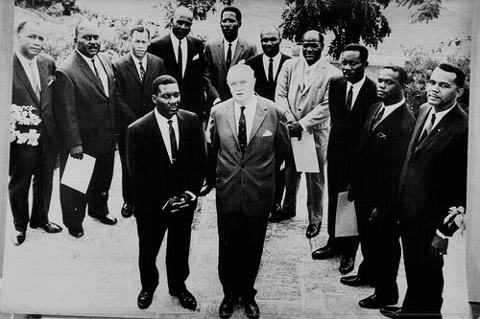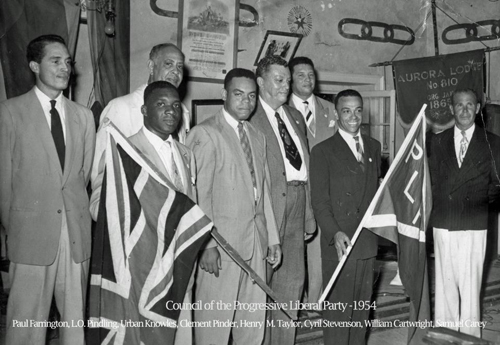From:TheBahamasWeekly.com
The Bahamas: The Road to Independence
By Oswald T. Brown
Jul 30, 2013 - 1:44:49 PM

Following his Progressive Liberal Party’s historic victory in the January 10, 1967 general election, Premier Lynden Oscar Pindling is pictured in the foreground with British Governor Sir Ralph Gray with members of his first cabinet in the background. From left are: Cecil Wallace Whitfield, Milo Butler, Arthur Hanna, Clarence A. Bain, Jeffrey M. Thompson, Carlton Francis, Randol Fawkes, Warren Levarity, Dr. Curtis McMillan and Clement Maynard.
|
As a former colony of Great Britain, The Bahamas’ attainment of independence on July 10, 1973, was relatively late when compared to some of its sister islands in the Caribbean that were also British colonies.
Jamaica, for example, after a failed attempt to establish a European Union-style West Indian Federation with Trinidad and Tobago and Barbados, became an independent country on August 6, 1962; Trinidad and Tobago followed on August 31, 1962; and Barbados severed its colonial “navel string” from Great Britain on November 30, 1966.
In the case of The Bahamas, with a population that’s 75 percent black, there was no real desire to pursue independence because the group of islands stretching like a string of pearls from 90 miles off the coast of Florida to about 50 miles off the coast of Cuba was controlled by a white minority with close historical and cultural ties to Great Britain.
The push to become independent really began in earnest in The Bahamas after the historic political victory of Progressive Liberal Party (PLP) in the January 10, 1967 general election, which resulted in a black government being elected for the first time to govern the affairs of the country.
But the trek towards black majority rule actually began in 1953 when the PLP became the first organized political party in The Bahamas and immediately began to challenge the unjust, openly racist policies of the group of white merchants and businessmen who controlled the affairs of The Bahamas as if it were their personal fiefdom.
Recognized at the time internationally as “a playground for the rich and famous,” The Bahamas’ importance to Great Britain became well established in the early 1940s during World War II when former King Edward VIII, who abdicated from the throne in 1936 to marry American socialite Wallace Simpson, was sent to The Bahamas as its governor.

Shortly after he completed his law studies in England, Lynden Oscar Pindling joined the fledgling Progressive Liberal Party (PLP). He is pictured with other members of the PLP Council in 1954. From left are Paul Farrington, L.O. Pindling, Urban Knowles, Clement Pinder, H.M. Taylor, Cyril Stevenson,
William “Bill” Cartwright, and Samuel Carey.
|
The white minority in the country, of course, welcomed the “high society” cultural traditions that became entrenched during the former king’s governance of The Bahamas, resulting in the black majority for the most part being treated as second-class citizens in their own country.
Racism was also openly practiced, with the white minority adopting some of the harsh segregation policies that were enforced by law at the time in the southern United States. Indeed, blacks were not allowed in the major hotels in New Providence, where the capital of Nassau is located, and were refused admission to a whites-only movie theatre, The Savoy, on Bay Street, the main street in downtown Nassau.
These were the vexing conditions that existed in The Bahamas when a young black lawyer, Lynden Oscar Pindling, returned to the country in 1953 after completing his law studies in England.
The fledgling PLP was in its infancy when Pindling became a member later that year and he quickly established himself as a future leader of the political party by championing the various causes of the black majority and routinely offering his legal services to poor blacks who could not afford a lawyer.
Known locally as “The Bay Street Boys,” members of the governing white minority, who at that point were not officially members of a political party, took notice of the threat the PLP posed to their political dominance and established the United Bahamian Party (UBP) to contest the general election held in1956. The PLP won 33 percent of the vote in that election, and Pindling was one of six PLPs elected to the House of Assembly.
Pindling continued to distinguish himself as a powerful force within the PLPs hierarchy and eventually became leader of the PLP at the party’s 1961 convention, with strong support from a group of young activists in the party who were members of the National Committee for Positive Action (NCPA).
With women voting for the first time in the country in 1962, the PLP was highly optimistic that it would win that election, but although it received the majority of the votes, the UBP won the majority of the House of Assembly seats mainly as a result of skillful gerrymandering of the electoral boundaries and questionable election laws that denied some blacks the right to vote.
However, in May 1963 a conference was convened in London to consider a new constitution for The Bahamas, resulting in the islands being granted full internal self-governance, with Great Britain retaining control of foreign affairs, defense, and internal security. The new constitution came into effect on January 7, 1964, setting the stage for the remarkable victory at the polls by the PLP on January 10, 1967.
Pindling, quite naturally, was hailed as “Moses” who lead black Bahamians to the “Promised Land” and the drumbeat for independence became louder and louder, with Great Britain eventually acceding to the wishes of the majority of Bahamians on July 10, 1973.
Pindling had been leader of the country since the January 10, 1967, general election, using the title of Premier, but after independence he became the country’s first Prime Minister and was subsequently Knighted by Queen Elizabeth II.
Sir Lynden was Prime Minister of The Bahamas for 25 years and was succeeded by Hubert Ingraham, who left the PLP to become leader of the opposition Free National Movement (FNM), and led the FNM to victory in the 1992 general election.
Ingraham served two five-year terms as Prime Minister before he was ousted after the FNM lost the 2002 general election to the PLP and Perry Gladstone Christie, leader of the PLP, became Prime Minister.
Ingraham returned as Prime Minister after the FNM defeated the PLP in the 2007 general election, Christie bounced back and led the PLP to a landslide election victory on May 7, 2012.
He is the current Prime Minister of Bahamas, which celebrated its 40th anniversary of independence in grand style two weeks ago throughout the Commonwealth and in countries where it has diplomatic missions.
In Washington, D.C, a gala reception, attended by more than 300 guests, was held at the OAS Building and the month-long celebration will continue on Saturday, August 3, when the Bahamas Embassy in D.C. will sponsor a two-day Music and Food Festival at One Veterans Place in Silver Spring, Maryland, featuring a Junkanoo group from The Bahamas as well as the world-renowned Royal Bahamas Police Force Marching Band, live entertainment from The Bahamas and a smorgasbord of indigenous Bahamian foods.
Oswald T. Brown is the press, cultural affairs and information manager at the Bahamas Embassy in Washington, D.C.
SEE ORIGINAL Document attached below:
© Copyright 2013 by thebahamasweekly.com -